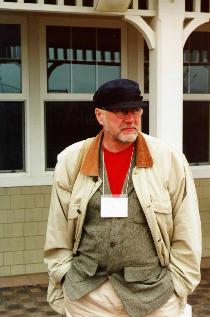

A non-native speaker is not the best person to deliver a fest speech, because he or she easily falls short of words and expressions in conveying feelings and meanings, and my well-known problems in this respect are grave. However, to make the WPT fest qualify as a fest according also to the Finnish norms, and sensitized by the fact that this is formally the last working day behind my own desk after 15 years in Oulu, I feel obliged to try to add posthumously something to what was already said.
In Oulu at the Midsummer Eve 1999
Sincerely Yours,
-Kari Kuutti

An End and a Beginning -- a Farewell Speech to WPT
by
Kari Kuutti
Every depart is a tiny death, a poet once said. And true it is: I greeted farewell to my former colleagues an hour ago, and although my departure may be only temporary, and my cooperation within the department has never been very active, with them went a part of my life. It is hard to imagine what is the scale of the feelings of the WPT group members, who have now to break ties formed in intense cooperation over a number of years. Their loss is bitter indeed, and the only what we can offer is empathy -- let it flow freely.
But it was also a loss for the community: a landmark -- perhaps the landmark -- has gone and the void will be felt long. The loss is, however, neither total nor fatal: there exists a loyal community formed during the life of the group and heavily influenced by what the group has done. The best way to pay back the intellectual debt we owe to the group is to build upon their work, to continue it and try to improve it. In this sense WPT has not been lost and never will: it will continue its existence in our current and future work.
That the work can and must continue is accentuated by the fact that although the group ceases to exist, its members have not lost anything from their skills and capabilities. Whatever course they will select for their future lives -- and I wish them the best success in doing so -- it is hard to believe that they would or even could stop working and influencing others working within the field. Because the interactions within the group will inevitably lessen, we can expect that their new audience for interactions will be broader and more varied than it used to be, and it is not a bold guess to assume, that something good will come out from these interactions. Despite the loss, we can thus also confidently wait the new that will emerge from the change.
There is also another sense of continuity involved. The scientific success and visibility of the WPT group, the productivity of its members, the fierce loyalty of its supporters, and then the abrupt and dramatic disbanding of the group -- this is not only a good story, it is stuff myths are made of: after the WPT fest and because of it war stories will be told around the camp fires, anecdotes will proliferate, characters and events will grow to mythical dimensions. And these stories will be not only about the recurrent Xerox problems in utilizing the in-house talent; there may be more on the relations between the group and the emergent research community. In the annals of the future not a footnote but chapters or whole books will be devoted to the interpretation of the enigma of WPT; what we have witnessed is a start of a legend. Not a bad start, may I say.
Every end is a beginning. And the WPT fest was an unique end. To see the people from all corners of the world to gather together only to share, made me proud just simply being a researcher. It is a joyous and glorious moment to find that there still exist such spheres of life where this kind of international, multi-cultural communities can spontaneously emerge and flourish. And while we were mourning the loss of WPT, it was this community that was mourning, and by sharing the loss it became more conscious and stronger, and that was and is the new beginning. So farewell, WPT. We will miss you, but you will continue living with us both as a legend and in the work we will do together.
And welcome, the new millennium. What has happened has made us now better prepared than ever to face the challenges of the next 20 years of research on work practices and technology.